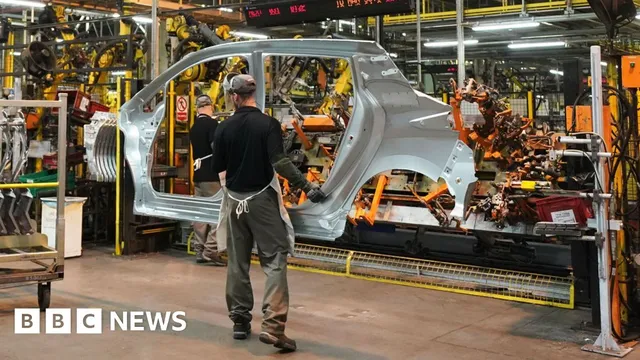
Nissan faces massive losses as car production costs rise in the UK
2025-04-24 13:37- Nissan's projected loss for the fiscal year is between 700 billion yen and 750 billion yen, primarily due to declining sales and asset value.
- High energy and labor costs at the Sunderland plant pose significant challenges, impacting the UK's competitiveness in automotive manufacturing.
- The company is urging the government for more support to boost electric vehicle production and sales in order to remain viable.
Express your sentiment!
Insights
In early May, Nissan Motor Corporation, headquartered in Japan, announced significant financial difficulties, projecting a total loss between 700 billion yen and 750 billion yen for the fiscal year that ends in March. This alarming forecast comes as the automaker grapples with declining sales and depreciation of its assets. The company had initially anticipated a much lower loss of 80 billion yen. A substantial driver of these losses stems from the impaired value of production assets after a comprehensive review across North America, Latin America, Europe, and Japan. Expectations for annual sales also fell to 3.35 million vehicles, slightly below prior projections of 3.4 million. Consequently, Nissan has faced challenges in maintaining competitiveness in key markets like the U.S. and China, which are growing increasingly dominated by rivals such as Tesla and BYD. Simultaneously, the company's Sunderland plant in the UK has been spotlighted for its excessive operational costs. Senior vice president of manufacturing Alan Johnson highlighted that the Sunderland facility pays more for electricity compared to any other Nissan factory globally. His remarks were presented during a House of Commons hearing, where he underscored the challenges of manufacturing in the UK due to rising energy costs and labor expenses. He urged the government for greater support for the automotive sector, particularly to encourage production and sales of electric vehicles. Although a late production shift at the Sunderland plant was closed, efforts were made to transition affected workers to other lines without job losses. Furthermore, the UK government has expressed a commitment to revitalizing advanced manufacturing through investments, including over £2.3 billion directed toward the transition to electric vehicles. However, despite these financial realities, Nissan maintains a healthy cash reserve of nearly 1.5 trillion yen and liquidity around 3.4 trillion yen. Newly appointed CEO Ivan Espinosa is focused on enhancing the company's agility in navigating these challenges. Recently, Nissan entered a new phase of collaboration with Honda on electric vehicles and smart technologies, indicating a potential shift in strategy as they acknowledge their need to catch up in the rapidly expanding EV market. The implications of these developments are severe; not only is Nissan facing a substantial financial setback, but the competitiveness of the UK as a manufacturing hub is under scrutiny. The struggles of Nissan in the context of rising production costs could signal broader concerns for automakers operating in the UK, as local suppliers and the workforce may feel the effects of these corporate decisions. Consequently, the future viability of car production in the UK remains uncertain as the industry adapts to a rapidly changing global landscape.
Contexts
The effect of energy prices on UK manufacturing is a critical issue that impacts economic performance, competitiveness, and long-term growth within the sector. As energy costs constitute a significant share of operational expenses for manufacturers, fluctuations in energy prices can have profound implications on production costs, profitability, and overall economic viability. When energy prices rise, manufacturers may face increased costs, leading to higher prices for goods, which can subsequently reduce competitiveness both domestically and internationally. This may result in diminished profit margins and could compel firms to consider downsizing, relocating, or even exiting certain markets altogether. Conversely, stable or declining energy prices can have the opposite effect, allowing manufacturers to invest in expansion and innovation, thereby driving productivity enhancements and growth in the sector. The UK manufacturing sector is highly diverse, with energy-intensive industries such as chemicals, metals, and textiles particularly vulnerable to shifts in energy pricing. These industries rely heavily on energy for processes and operations, making them sensitive to any fluctuations. Moreover, energy prices may be influenced by various factors including international market trends, government policies, and geopolitical events, all of which can create uncertainty for manufacturers. Thus, a surge in energy prices can lead to a ripple effect, where manufacturers are forced to pass on higher costs to consumers or scale back production, ultimately impacting economic growth and employment rates in the wider economy. In response to rising energy prices, companies are increasingly exploring strategies to mitigate risks and manage costs. This includes investing in energy efficiency measures, transitioning to renewable energy sources, and incorporating advanced technologies to reduce overall energy consumption. By adopting such practices, manufacturers can not only cushion the impact of volatile energy prices but also contribute to the UK’s climate change commitments and sustainability goals. Government support, such as subsidies for energy-efficient technologies or financial incentives for renewable energy investments, can further bolster the sector’s resilience to energy price fluctuations. Collaborations between industry and government will be essential in creating a stable environment that fosters growth and competitiveness. The long-term outlook for the UK manufacturing sector will depend significantly on the trajectory of energy prices and the ability of firms to adapt to changing conditions. Enhancing resilience through investment in technology, energy management, and sustainability is vital for manufacturers seeking to maintain competitive advantages in a global marketplace heavily influenced by energy costs. By fostering innovation and encouraging strategic planning, the UK manufacturing sector can position itself to thrive despite the challenges posed by energy price volatility. Ultimately, understanding the intricate relationship between energy prices and the manufacturing sector will be essential for stakeholders focused on ensuring enduring economic strength and stability in the UK.